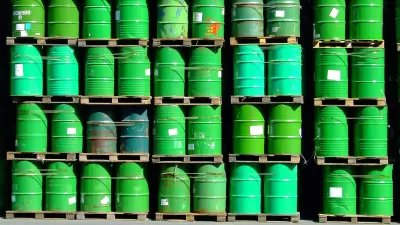The hazards of shipping North Dakotan crude-by-rail have been well documented and are the focus of new DOT regulations due to its volatility, but there's a more positive side to this oil and the trains that deliver it, illustrated in Philadelphia.
We recently reported on demonstrations in California at a Bay Area facility that would store oil from North Dakota that would be delivered by rail.
In Philadelphia, the report [listen here] by Katie Colaneri of Philadelphia's WHYY public radio station includes a celebration from last fall as the first oil unit train arrives from North Dakota at a huge refinery carrying the same volatile crude that has stirred the fears of Pittsburg, Calif. residents.
Why the different receptions to crude-by-rail from the Bakken shale formation? In Philadelphia, the combination of cheap Bakken crude and oil unit trains means that an aging oil refinery will not have to close. "Hundreds of workers were getting pink slips," states Colaneri.
Last fall, workers in blue jumpsuits applauded as a train hauling 120 black tanker cars full of crude oil from North Dakota pulled into the 140-year-old refinery complex in South Philadelphia.
Today, the Philadelphia Energy Solutions refinery is the single-largest consumer of North Dakota crude oil [and also "the largest oil refining complex on the U.S. Eastern seaboard", according to its website.]
However, energy analyst Kevin Lindemer with the firm IHS, tells Colaneri that pipelines would be preferable to oil trains.
Without pipelines to move it underground, increased traffic on the rails has resulted in more derailments across the country. In January, a derailment in Philadelphia left six tanker cars full of oil intact, but leaning across the tracks of a bridge that spans [the Schuylkill River] and a busy interstate.
In addition to pipelines to replace oil trains, natural gas pipelines are needed to access Pennsylvania's abundant natural gas from the Marcellus Shale, states the refinery's CEO, Phil Rinaldi, which "would revitalize the entire region...by build(ing) a dynamic, manufacturing-based economy."
Lindemer agrees. What's holding back the region is infrastructure, he emphasizes. And infrastructure means energy pipelines.
FULL STORY: Philadelphia Capitalizes On Energy Boom

Maui's Vacation Rental Debate Turns Ugly
Verbal attacks, misinformation campaigns and fistfights plague a high-stakes debate to convert thousands of vacation rentals into long-term housing.

Planetizen Federal Action Tracker
A weekly monitor of how Trump’s orders and actions are impacting planners and planning in America.

In Urban Planning, AI Prompting Could be the New Design Thinking
Creativity has long been key to great urban design. What if we see AI as our new creative partner?

King County Supportive Housing Program Offers Hope for Unhoused Residents
The county is taking a ‘Housing First’ approach that prioritizes getting people into housing, then offering wraparound supportive services.

Researchers Use AI to Get Clearer Picture of US Housing
Analysts are using artificial intelligence to supercharge their research by allowing them to comb through data faster. Though these AI tools can be error prone, they save time and housing researchers are optimistic about the future.

Making Shared Micromobility More Inclusive
Cities and shared mobility system operators can do more to include people with disabilities in planning and operations, per a new report.
Urban Design for Planners 1: Software Tools
This six-course series explores essential urban design concepts using open source software and equips planners with the tools they need to participate fully in the urban design process.
Planning for Universal Design
Learn the tools for implementing Universal Design in planning regulations.
planning NEXT
Appalachian Highlands Housing Partners
Mpact (founded as Rail~Volution)
City of Camden Redevelopment Agency
City of Astoria
City of Portland
City of Laramie



























